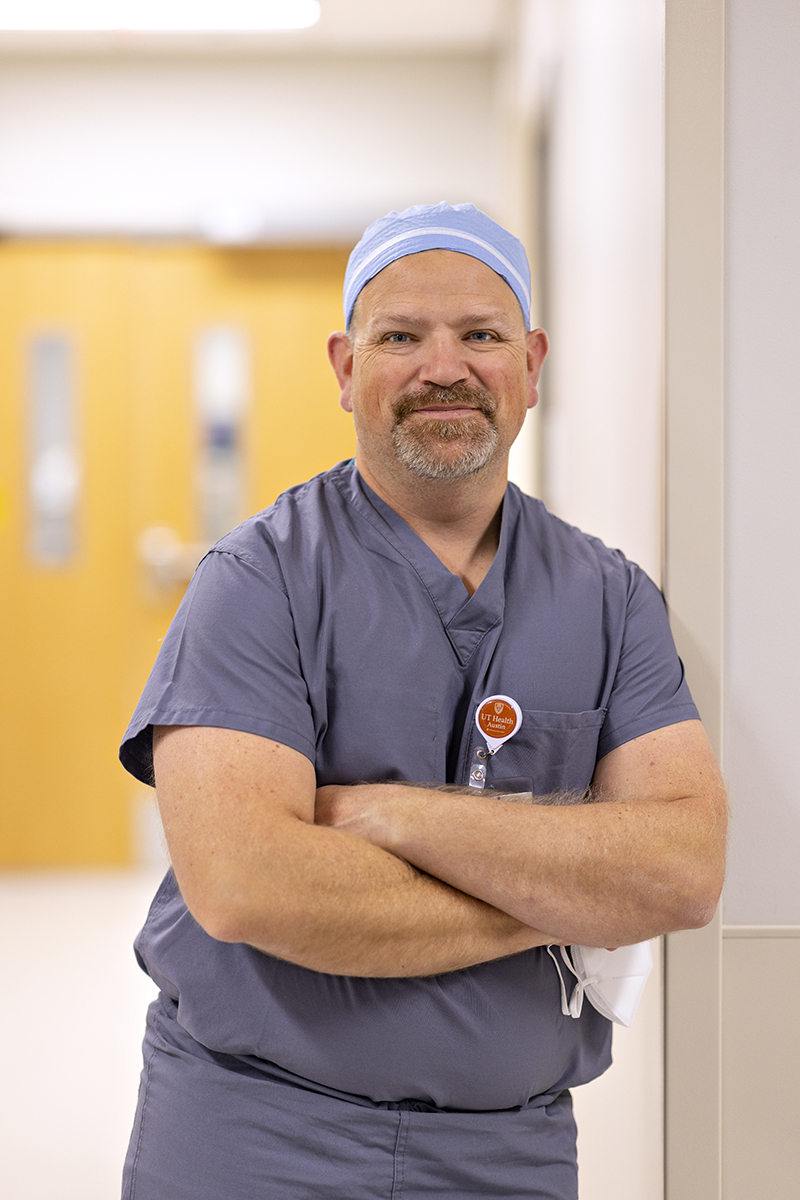Information, Communication, and Trust
How a patient and his care team became partners in a more personalized model of caring
Reviewed by: Jeff (patient) and Karl Koenig, MD, FAOA, FAAOS, FAAHKS
Written by: Gene Lazuta

If there is one thing Jeff understands, it’s that nothing in life happens in isolation. As a 62-year-old Austin resident who has spent his life as an investigative journalist writing award-winning articles and books, he knows from experience that today’s decisions will resonate in the future as surely as yesterday’s choices define today. So, when asked to describe his recent experience at UT Health Austin, where board-certified orthopedic surgeon Karl Koenig, MD, FAOA, FAAOS, FAAHKS, who serves as the Medical Director of the Musculoskeletal Institute, and his multidisciplinary team performed Jeff’s hip replacement surgery, Jeff is careful to highlight what he considers to be the crucial combination of communication and expertise that helped him fully understand and actively participate in every aspect of his care and recovery.
“The idea that I could walk into UT Health Austin’s Ambulatory Surgery Center at seven o’clock in the morning, begin my surgery at eight-thirty, be out by eleven-thirty, take my first, careful steps at one in the afternoon, and be home by three, is amazing,” says Jeff. “And, while I understand that my personal experience is unique to me, I know the reason it happened the way it did is because Dr. Koenig and his team use information and communication to make sure every patient is an active part of the process. Our relationship harkens back to what I imagine as the old family doctor experience. The care team took the time to understand who I am as a person, my situation, my goals, and the way I live. They got to know my wife, who accompanied me to appointments and was my teammate and advisor. I came to trust that they had the experience and skills necessary to perform my surgery, and I believe they came to trust that, with my wife offering love and support, I would do everything I needed to do, before and after my surgery, to make my procedure a success. That trust between us was crucial, and it made a real difference.”
Jeff’s first warning that something was amiss came when his hips started feeling stiff. When asked if he is an active person, he smiles and nods, describing how he can usually be found biking 20-30 miles on the weekend. And, though he isn’t a “marathon runner,” he also mentions the six weeks he spent skiing across the Arctic, towing a toboggan loaded with over one hundred pounds of gear, and that time he climbed Mount Kilimanjaro. So, when stretching didn’t make the stiffness go away, Jeff visited a physical therapist who delivered the unexpected news that he had arthritis in his hips. An X-ray verified Jeff’s arthritis was advanced and he would need hip replacement surgery. His primary care physician informed him it was time to consult a specialist.
Before agreeing to a surgery as significant as a full hip replacement, Jeff applied his investigative skills to determine his range of potential choices, not only regarding what type of care he would receive, but also who he would choose to deliver that care. What he found is that there is a massive amount of healthcare information available, particularly online, and it can vary dramatically in quality.
The experience taught him to do three important things that he believes would be helpful to anyone researching a health-related condition or medical procedure:
- Honestly assess yourself, your life, and your goals to help match your expectations to your options. A good question to ask is, “Does the person described as a candidate for this particular therapy sound like me?” Matching who you are with what you expect from your care will help you start weighing the potential risks inherent in any medical intervention against the benefits you may expect.
- Consult multiple sources and maintain a discerning attitude as you do. Always ask yourself, “Does what they are describing here sound reasonable?” Not every provider is right for every patient, and not every patient is right for every procedure. Seek multiple opinions, particularly when surgery is involved. Ask questions, and listen very carefully to the answers. If possible, bring someone along and discuss what you both heard afterward to ensure a clear and thorough understanding.
- Take ownership of your care. “Do you have someone you can rely on and trust to help you during the first stages of recovery?” This is really important, because you need to feel confident that you are prepared to handle whatever comes your way. Ultimately, there is nothing more personal than your health, so the things you do to preserve and improve it are investments in your future. They will impact you and your family, and you must be ready to commit to doing your part in partnership with your care team.
The Musculoskeletal Institute’s approach to treating the “whole person” and to making surgery one, but not the only, option available appealed to Jeff. In turn, he set up an appointment, and he and his wife visited UT Health Austin.

“During our consultations with Dr. Koenig and his team,” explains Jeff, “we asked a lot of questions about their history and experience with this procedure. In particular, we asked them, ‘How often do you do this surgery? How does my condition compare to other patients you’ve seen? Where am I on the spectrum of your patients? Am I an easy case? Am I a hard case? What can I expect for side effects? What is the estimated recovery time? Am I at risk for complications? What can I do, before and after my surgery, to help make things go as smoothly as possible?’ We asked them everything we could think to ask, and it soon became clear that not only did they really know what they were talking about, but they were also committed to providing all the information we needed to help me make the decision that would be right for me.”
In the end, it was Jeff’s understanding of the connections that exist between the various aspects of a person’s life that made his decision clear. Not only was his pain and limited mobility affecting him in noticeable ways, but he also knew those effects went beyond the obvious. Pain would inevitably be a factor in any number of decisions he would make going forward, changing his activities and even his perception of himself and his capabilities. Since the choice of having surgery was not a question of “if” but of “when,” he decided to proceed with Dr. Koenig as his surgeon. The outcome, he shares, has been positive in a way that he found unexpected yet encouraging:
“My UT Health Austin experience gave me a renewed sense of trust and faith in institutions, technology, and expertise,” says Jeff. “The values Dr. Koenig shared with me – of bringing quality health care to everyone in the community regardless of their means, of providing exactly the kind of care someone needs, and of bringing professionals with different skills together to treat each patient as a unique and complicated individual in addition to the incredible technical and surgical expertise that went on behind the scenes – all those things added up are why I walked out of the Ambulatory Surgery Center that afternoon knowing I have a doctor who cares what happens to me as a person. It’s incredible. It’s made me think about the world in which we live and the people who live in it a bit differently. And, it all started when everyone on Dr. Koenig’s team placed their trust in me as their patient and gave me the time, information, and respect I needed to place my trust in them.”
To make an appointment with the Musculoskeletal Institute, call 1-833-UT-CARES (1-833-882-2737) or visit here.